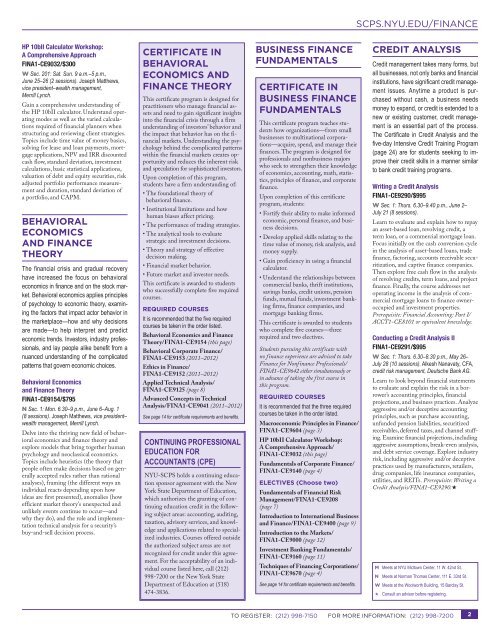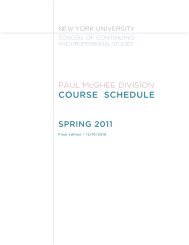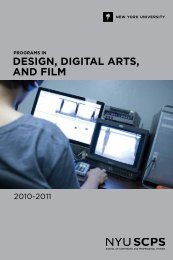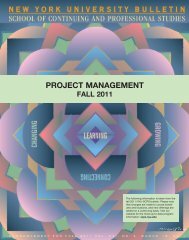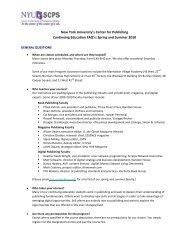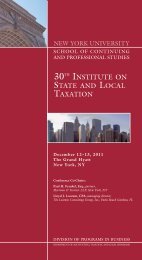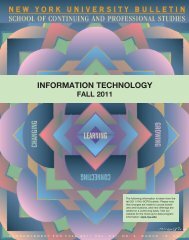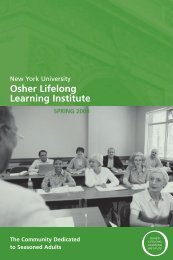finance - School of Continuing and Professional Studies - New York ...
finance - School of Continuing and Professional Studies - New York ...
finance - School of Continuing and Professional Studies - New York ...
Create successful ePaper yourself
Turn your PDF publications into a flip-book with our unique Google optimized e-Paper software.
SCPS.NYU.EDU/FINANCE<br />
HP 10bII Calculator Workshop:<br />
A Comprehensive Approach<br />
FINA1-CE9032/$300<br />
W Sec. 201: Sat. Sun. 9 a.m.–5 p.m.,<br />
June 25–26 (2 sessions). Joseph Matthews,<br />
vice president–wealth management,<br />
Merrill Lynch.<br />
Gain a comprehensive underst<strong>and</strong>ing <strong>of</strong><br />
the HP 10bII calculator. Underst<strong>and</strong> operating<br />
modes as well as the varied calculations<br />
required <strong>of</strong> financial planners when<br />
structuring <strong>and</strong> reviewing client strategies.<br />
Topics include time value <strong>of</strong> money basics,<br />
solving for lease <strong>and</strong> loan payments, mortgage<br />
applications, NPV <strong>and</strong> IRR discounted<br />
cash flow, st<strong>and</strong>ard deviation, investment<br />
calculations, basic statistical applications,<br />
valuation <strong>of</strong> debt <strong>and</strong> equity securities, risk<br />
adjusted portfolio performance measurement<br />
<strong>and</strong> duration, st<strong>and</strong>ard deviation <strong>of</strong><br />
a portfolio, <strong>and</strong> CAPM.<br />
BEHAVIORAL<br />
ECONOMICS<br />
AND FINANCE<br />
THEORY<br />
The financial crisis <strong>and</strong> gradual recovery<br />
have increased the focus on behavioral<br />
economics in <strong>finance</strong> <strong>and</strong> on the stock market.<br />
Behavioral economics applies principles<br />
<strong>of</strong> psychology to economic theory, examining<br />
the factors that impact actor behavior in<br />
the marketplace—how <strong>and</strong> why decisions<br />
are made—to help interpret <strong>and</strong> predict<br />
economic trends. Investors, industry pr<strong>of</strong>essionals,<br />
<strong>and</strong> lay people alike benefit from a<br />
nuanced underst<strong>and</strong>ing <strong>of</strong> the complicated<br />
patterns that govern economic choices.<br />
Behavioral Economics<br />
<strong>and</strong> Finance Theory<br />
FINA1-CE9154/$795<br />
N Sec. 1: Mon. 6.30–9 p.m., June 6–Aug. 1<br />
(8 sessions). Joseph Matthews, vice president–<br />
wealth management, Merrill Lynch.<br />
Delve into the thriving new field <strong>of</strong> behavioral<br />
economics <strong>and</strong> <strong>finance</strong> theory <strong>and</strong><br />
explore models that bring together human<br />
psychology <strong>and</strong> neoclassical economics.<br />
Topics include heuristics (the theory that<br />
people <strong>of</strong>ten make decisions based on generally<br />
accepted rules rather than rational<br />
analyses), framing (the different ways an<br />
individual reacts depending upon how<br />
ideas are first presented), anomalies (how<br />
efficient market theory’s unexpected <strong>and</strong><br />
unlikely events continue to occur—<strong>and</strong><br />
why they do), <strong>and</strong> the role <strong>and</strong> implementation<br />
technical analysis for a security’s<br />
buy-<strong>and</strong>-sell decision process.<br />
CERTIFICATE IN<br />
BEHAVIORAL<br />
ECONOMICS AND<br />
FINANCE THEORY<br />
This certificate program is designed for<br />
practitioners who manage financial assets<br />
<strong>and</strong> need to gain significant insights<br />
into the financial crisis through a firm<br />
underst<strong>and</strong>ing <strong>of</strong> investors’ behavior <strong>and</strong><br />
the impact that behavior has on the financial<br />
markets. Underst<strong>and</strong>ing the psychology<br />
behind the complicated patterns<br />
within the financial markets creates opportunity<br />
<strong>and</strong> reduces the inherent risk<br />
<strong>and</strong> speculation for sophisticated investors.<br />
Upon completion <strong>of</strong> this program,<br />
students have a firm underst<strong>and</strong>ing <strong>of</strong>:<br />
• The foundational theory <strong>of</strong><br />
behavioral <strong>finance</strong>.<br />
• Institutional limitations <strong>and</strong> how<br />
human biases affect pricing.<br />
• The performance <strong>of</strong> trading strategies.<br />
• The analytical tools to evaluate<br />
strategic <strong>and</strong> investment decisions.<br />
• Theory <strong>and</strong> strategy <strong>of</strong> effective<br />
decision making.<br />
• Financial market behavior.<br />
• Future market <strong>and</strong> investor needs.<br />
This certificate is awarded to students<br />
who successfully complete five required<br />
courses.<br />
REQUIRED COURSES<br />
It is recommended that the five required<br />
courses be taken in the order listed.<br />
Behavioral Economics <strong>and</strong> Finance<br />
Theory/FINA1-CE9154 (this page)<br />
Behavioral Corporate Finance/<br />
FINA1-CE9153 (2011–2012)<br />
Ethics in Finance/<br />
FINA1-CE9152 (2011–2012)<br />
Applied Technical Analysis/<br />
FINA1-CE9125 (page 8)<br />
Advanced Concepts in Technical<br />
Analysis/FINA1-CE9041 (2011–2012)<br />
See page 14 for certificate requirements <strong>and</strong> benefits.<br />
CONTINUING PROFESSIONAL<br />
EDUCATION FOR<br />
ACCOUNTANTS (CPE)<br />
NYU-SCPS holds a continuing education<br />
sponsor agreement with the <strong>New</strong><br />
<strong>York</strong> State Department <strong>of</strong> Edu cation,<br />
which authorizes the granting <strong>of</strong> continuing<br />
education credit in the following<br />
subject areas: accounting, auditing,<br />
taxation, advisory services, <strong>and</strong> knowledge<br />
<strong>and</strong> applications related to specialized<br />
industries. Courses <strong>of</strong>fered outside<br />
the authorized subject areas are not<br />
recognized for credit under this agreement.<br />
For the acceptability <strong>of</strong> an individual<br />
course listed here, call (212)<br />
998-7200 or the <strong>New</strong> <strong>York</strong> State<br />
Department <strong>of</strong> Education at (518)<br />
474-3836.<br />
BUSINESS FINANCE<br />
FUNDAMENTALS<br />
CERTIFICATE IN<br />
BUSINESS FINANCE<br />
FUNDAMENTALS<br />
This certificate program teaches students<br />
how organizations—from small<br />
businesses to multinational corporations—acquire,<br />
spend, <strong>and</strong> manage their<br />
<strong>finance</strong>s. The program is designed for<br />
pr<strong>of</strong>essionals <strong>and</strong> nonbusiness majors<br />
who seek to strengthen their knowledge<br />
<strong>of</strong> economics, accounting, math, statistics,<br />
principles <strong>of</strong> <strong>finance</strong>, <strong>and</strong> corporate<br />
<strong>finance</strong>.<br />
Upon completion <strong>of</strong> this certificate<br />
program, students:<br />
• Fortify their ability to make informed<br />
economic, personal <strong>finance</strong>, <strong>and</strong> business<br />
decisions.<br />
• Develop applied skills relating to the<br />
time value <strong>of</strong> money, risk analysis, <strong>and</strong><br />
money supply.<br />
• Gain pr<strong>of</strong>iciency in using a financial<br />
calculator.<br />
• Underst<strong>and</strong> the relationships between<br />
commercial banks, thrift institutions,<br />
savings banks, credit unions, pension<br />
funds, mutual funds, investment banking<br />
firms, <strong>finance</strong> companies, <strong>and</strong><br />
mortgage banking firms.<br />
This certificate is awarded to students<br />
who complete five courses—three<br />
required <strong>and</strong> two electives.<br />
Students pursuing this certificate with<br />
no <strong>finance</strong> experience are advised to take<br />
Finance for Non<strong>finance</strong> Pr<strong>of</strong>essionals/<br />
FINA1-CE9642 either simultaneously or<br />
in advance <strong>of</strong> taking the first course in<br />
this program.<br />
REQUIRED COURSES<br />
It is recommended that the three required<br />
courses be taken in the order listed.<br />
Macroeconomic Principles in Finance/<br />
FINA1-CE9604 (page 3)<br />
HP 10bII Calculator Workshop:<br />
A Comprehensive Approach/<br />
FINA1-CE9032 (this page)<br />
Fundamentals <strong>of</strong> Corporate Finance/<br />
FINA1-CE9140 (page 4)<br />
ELECTIVES (Choose two)<br />
Fundamentals <strong>of</strong> Financial Risk<br />
Management/FINA1-CE9208<br />
(page 7)<br />
Introduction to International Business<br />
<strong>and</strong> Finance/FINA1-CE9400 (page 9)<br />
Introduction to the Markets/<br />
FINA1-CE9000 (page 12)<br />
Investment Banking Fundamentals/<br />
FINA1-CE9160 (page 11)<br />
Techniques <strong>of</strong> Financing Corporations/<br />
FINA1-CE9670 (page 4)<br />
See page 14 for certificate requirements <strong>and</strong> benefits.<br />
CREDIT ANALYSIS<br />
Credit management takes many forms, but<br />
all businesses, not only banks <strong>and</strong> financial<br />
institutions, have significant credit management<br />
issues. Anytime a product is purchased<br />
without cash, a business needs<br />
money to exp<strong>and</strong>, or credit is extended to a<br />
new or existing customer, credit management<br />
is an essential part <strong>of</strong> the process.<br />
The Certificate in Credit Analysis <strong>and</strong> the<br />
five-day Intensive Credit Training Program<br />
(page 24) are for students seeking to improve<br />
their credit skills in a manner similar<br />
to bank credit training programs.<br />
Writing a Credit Analysis<br />
FINA1-CE9290/$995<br />
W Sec. 1: Thurs. 6.30–9.40 p.m., June 2–<br />
July 21 (8 sessions).<br />
Learn to evaluate <strong>and</strong> explain how to repay<br />
an asset-based loan, revolving credit, a<br />
term loan, or a commercial mortgage loan.<br />
Focus initially on the cash conversion cycle<br />
in the analysis <strong>of</strong> asset-based loans, trade<br />
<strong>finance</strong>, factoring, accounts receivable securitization,<br />
<strong>and</strong> captive <strong>finance</strong> companies.<br />
Then explore free cash flow in the analysis<br />
<strong>of</strong> revolving credits, term loans, <strong>and</strong> project<br />
<strong>finance</strong>. Finally, the course addresses net<br />
operating income in the analysis <strong>of</strong> commercial<br />
mortgage loans to <strong>finance</strong> owneroccupied<br />
<strong>and</strong> investment properties.<br />
Prerequisite: Financial Accounting: Part I/<br />
ACCT1-CE8101 or equivalent knowledge.<br />
Conducting a Credit Analysis II<br />
FINA1-CE9291/$995<br />
W Sec. 1: Thurs. 6.30–8.30 p.m., May 26–<br />
July 28 (10 sessions). Alkesh Nanavaty, CFA,<br />
credit risk management, Deutsche Bank AG.<br />
Learn to look beyond financial statements<br />
to evaluate <strong>and</strong> explain the risk in a borrower’s<br />
accounting principles, financial<br />
projections, <strong>and</strong> business practices. Analyze<br />
aggressive <strong>and</strong>/or deceptive accounting<br />
principles, such as purchase accounting,<br />
unfunded pension liabilities, securitized<br />
receivables, deferred taxes, <strong>and</strong> channel stuffing.<br />
Examine financial projections, including<br />
aggressive assumptions, break-even analysis,<br />
<strong>and</strong> debt service coverage. Explore industry<br />
risk, including aggressive <strong>and</strong>/or deceptive<br />
practices used by manufacturers, retailers,<br />
drug companies, life insurance companies,<br />
utilities, <strong>and</strong> REITs. Prerequisite: Writing a<br />
Credit Analysis/FINA1-CE9290.H<br />
M Meets at NYU Midtown Center, 11 W. 42nd St.<br />
N Meets at Norman Thomas Center, 111 E. 33rd St.<br />
W Meets at the Woolworth Building, 15 Barclay St.<br />
H Consult an advisor before registering.<br />
TO REGISTER: (212) 998-7150 FOR MORE INFORMATION: (212) 998-7200<br />
2


